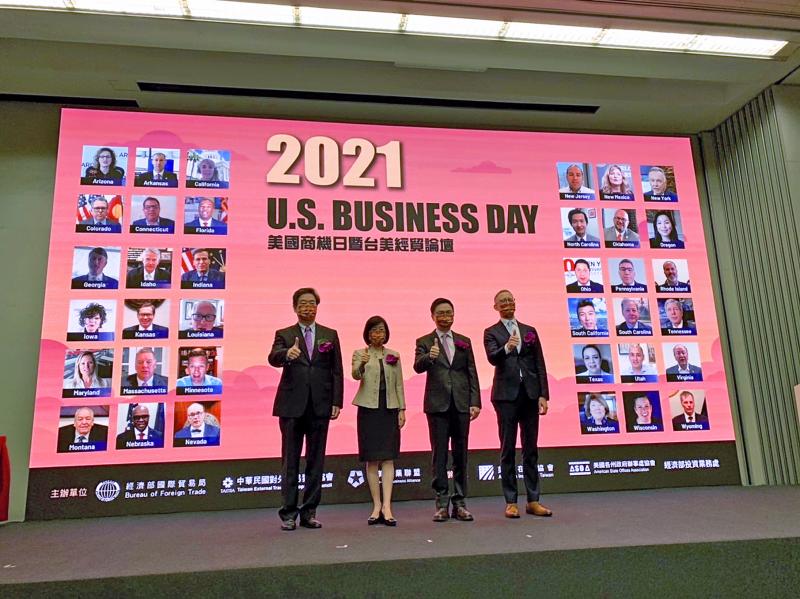The Ministry of Economic Affairs yesterday signed memorandums of understanding (MOU) to deepen bilateral trade cooperation with Arizona and New Mexico during a virtual ceremony at the opening of the 10th US Business Day in Taipei.
The annual event is hosted by the ministry and the Taiwan External Trade Development Council (TAITRA, 外貿協會), with this year’s being held at the Taipei International Convention Center yesterday and today.
Taiwan-US business cooperation and partnerships are at their best right now, TAITRA said in a statement.

Photo: Lin Jin-hua, Taipei Times
Seminars and symposiums are being held at the event under the Taiwan-US Trade Forum, a platform designed for Taiwan to create new trade strategies for US markets and for the US to promote information regarding business opportunities from infrastructure projects in US states, TAITRA said.
Cynthia Kiang (江文若), director-general of the ministry’s Bureau of Foreign Trade, and Brent Omdahl, the commercial section chief of the American Institute in Taiwan, attended the opening ceremony, as did US Department of Commerce Acting Deputy Assistant Secretary for Asia Richard Steffens via videoconference.
Kiang signed MOUs with the Arizona Commerce Authority and the New Mexico Economic Development Department to deepen bilateral economic and trade cooperation in the semiconductor and information communication technology industries.
Despite the enormous economic damage caused by the COVID-19 pandemic over the past year, trade ties between Taiwan and the US remained tight, Kiang said.
The resilience is shown by the data, with Taiwan-US trade exceeding US$83 billion last year, while both countries have increased bilateral investment, she said.
For instance, US tech companies such as Alphabet Inc’s Google and Microsoft Corp have increased investments in Taiwan, while contract chipmaker Taiwan Semiconductor Manufacturing Co (台積電) and electronics contract manufacturer Hon Hai Precision Industry Co (鴻海精密) have expanded their investments in the US, Kiang said.
TAITRA Chairman James Huang (黃志芳) said that this year’s forum is focused on topics related to 5G, clean energy, supply chains and electric vehicles, with the aim of improving business and trade ties between the two countries.
In the hours after the event started yesterday morning, more than 20 US-based buyers had specified purchasing needs for products including information communication devices, machinery, metal fasteners, auto parts and components, and bicycle parts, TAITRA said.

The US dollar was trading at NT$29.7 at 10am today on the Taipei Foreign Exchange, as the New Taiwan dollar gained NT$1.364 from the previous close last week. The NT dollar continued to rise today, after surging 3.07 percent on Friday. After opening at NT$30.91, the NT dollar gained more than NT$1 in just 15 minutes, briefly passing the NT$30 mark. Before the US Department of the Treasury's semi-annual currency report came out, expectations that the NT dollar would keep rising were already building. The NT dollar on Friday closed at NT$31.064, up by NT$0.953 — a 3.07 percent single-day gain. Today,

‘SHORT TERM’: The local currency would likely remain strong in the near term, driven by anticipated US trade pressure, capital inflows and expectations of a US Fed rate cut The US dollar is expected to fall below NT$30 in the near term, as traders anticipate increased pressure from Washington for Taiwan to allow the New Taiwan dollar to appreciate, Cathay United Bank (國泰世華銀行) chief economist Lin Chi-chao (林啟超) said. Following a sharp drop in the greenback against the NT dollar on Friday, Lin told the Central News Agency that the local currency is likely to remain strong in the short term, driven in part by market psychology surrounding anticipated US policy pressure. On Friday, the US dollar fell NT$0.953, or 3.07 percent, closing at NT$31.064 — its lowest level since Jan.

The New Taiwan dollar and Taiwanese stocks surged on signs that trade tensions between the world’s top two economies might start easing and as US tech earnings boosted the outlook of the nation’s semiconductor exports. The NT dollar strengthened as much as 3.8 percent versus the US dollar to 30.815, the biggest intraday gain since January 2011, closing at NT$31.064. The benchmark TAIEX jumped 2.73 percent to outperform the region’s equity gauges. Outlook for global trade improved after China said it is assessing possible trade talks with the US, providing a boost for the nation’s currency and shares. As the NT dollar

The Financial Supervisory Commission (FSC) yesterday met with some of the nation’s largest insurance companies as a skyrocketing New Taiwan dollar piles pressure on their hundreds of billions of dollars in US bond investments. The commission has asked some life insurance firms, among the biggest Asian holders of US debt, to discuss how the rapidly strengthening NT dollar has impacted their operations, people familiar with the matter said. The meeting took place as the NT dollar jumped as much as 5 percent yesterday, its biggest intraday gain in more than three decades. The local currency surged as exporters rushed to